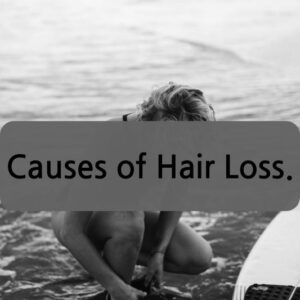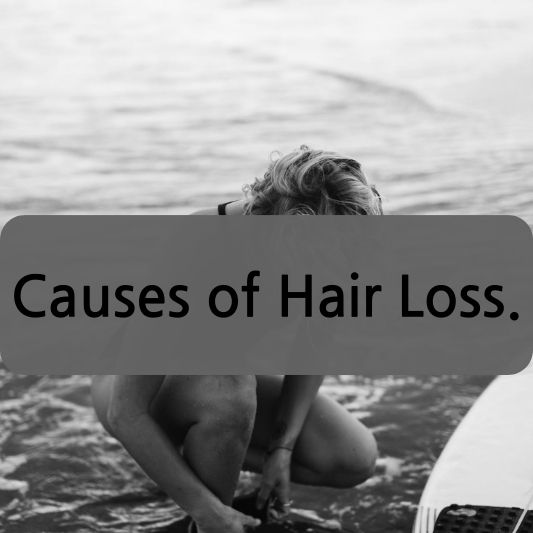Hair loss is a concern that affects many individuals, transcending age and gender boundaries. While it’s a natural part of the hair growth cycle to shed some hair daily, excessive hair loss can be alarming and may indicate an underlying issue. In this comprehensive guide, we’ll delve into the various causes of hair loss, exploring everything from genetic factors to lifestyle choices and potential treatment options.

The Basics of Hair Growth
Understanding the hair growth cycle is crucial to identifying the causes of hair loss. Hair goes through a continuous cycle of growth, rest, and shedding. Factors disrupting this cycle can lead to hair loss.
Common Types of Hair Loss
Androgenetic Alopecia
Androgenetic alopecia, commonly known as male-pattern baldness or female-pattern baldness, is a hereditary condition that can affect both men and women.
Telogen Effluvium
This type of hair loss is often triggered by a significant life event or stress, causing more hair follicles to enter the resting phase.
Alopecia Areata
Alopecia areata is an autoimmune condition where the immune system mistakenly attacks hair follicles, leading to hair loss in small, round patches.
Lifestyle Factors and Hair Health
Diet and Nutrition
A balanced diet rich in vitamins and minerals is essential for healthy hair. Nutrient deficiencies can contribute to hair loss.
Stress and its Impact
Chronic stress can disrupt the hair growth cycle, leading to increased shedding. Managing stress is crucial for maintaining healthy hair.
Sleep Patterns
Inadequate sleep can affect hormonal balance, potentially contributing to hair loss. Establishing good sleep habits is vital for overall well-being.
Hormonal Influences on Hair Loss
Thyroid Disorders
Disorders of the thyroid gland can impact hair growth. Both hypothyroidism and hyperthyroidism may lead to hair loss.
Hormonal Changes in Women
Hormonal fluctuations during pregnancy, childbirth, and menopause can contribute to hair loss in women.
Genetics and Hair Loss
Genetic factors play a significant role in determining susceptibility to hair loss. If your parents experienced hair loss, you may be more prone to it.
Environmental Factors
Pollution
Exposure to environmental pollutants can damage hair and contribute to hair loss. Protecting your hair from pollution is essential.
Hard Water
Hard water, rich in minerals like calcium and magnesium, can weaken hair and contribute to breakage. Consider using a water softener.
Hair Care Practices
Overstyling and Heat Damage
Excessive use of styling tools and heat can damage hair and lead to breakage. Adopting gentler styling practices can promote hair health.
Incorrect Hair Products
Using the wrong hair products can cause damage. Choose products suitable for your hair type and specific needs.
Medical Conditions and Hair Loss
Scalp Infections
Infections of the scalp, such as ringworm, can lead to hair loss. Prompt treatment is essential to prevent further damage.
Autoimmune Diseases
Certain autoimmune conditions, like lupus, can cause hair loss. Managing the underlying autoimmune condition is crucial.
The Role of Age in Hair Loss
As individuals age, the rate of hair growth may slow down, and hair follicles may become thinner. Accepting these natural changes is a part of the aging process.
Prevention Strategies
Healthy Lifestyle Habits
Adopting a healthy lifestyle, including a balanced diet and regular exercise, can contribute to overall well-being, including hair health.
Regular Hair Care Routine
Establishing a regular hair care routine, including gentle washing and conditioning, can help maintain a healthy scalp and hair.
Seeking Professional Advice
If experiencing significant hair loss, consulting a healthcare professional or a dermatologist is crucial for proper diagnosis and guidance.
Treatment Options
Topical Medications
Topical treatments like minoxidil can stimulate hair growth and slow down the progression of hair loss.
Oral Medications
Prescription medications, such as finasteride, may be recommended to combat hair loss, especially in cases of androgenetic alopecia.
Hair Transplants
For more severe cases of hair loss, surgical procedures like hair transplants can provide a long-term solution.
Natural Remedies for Hair Loss
Essential Oils
Some essential oils, such as lavender and rosemary, are believed to promote hair growth. However, scientific evidence is limited, and caution is advised.
Dietary Supplements
Supplements like biotin and iron may support hair health. Consult with a healthcare professional before adding supplements to your routine.
The Emotional Impact of Hair Loss
Hair loss can have a significant emotional toll on individuals. Addressing the emotional aspects is crucial for overall well-being.
Embracing Change and Self-Acceptance
Accepting and embracing changes in your appearance is an essential aspect of self-love. Hair loss doesn’t diminish your worth or beauty.
conclusion
understanding the various causes of hair loss empowers individuals to make informed choices regarding their hair care. Whether it’s adopting a healthier lifestyle, seeking professional advice, or considering treatment options, there are proactive steps to address and manage hair loss. Remember, each person’s journey is unique, and self-acceptance is a key component of overall well-being.
FAQs about Hair Loss
Is hair loss preventable?
While some causes of hair loss are preventable, such as maintaining a healthy lifestyle, others, like genetic factors, may be more challenging to control. Adopting good hair care practices and seeking professional advice can help manage and reduce the impact of hair loss.
Are natural remedies effective in treating hair loss?
Natural remedies, such as essential oils and dietary supplements, may offer some benefits, but their effectiveness varies from person to person. It’s essential to approach natural remedies with caution and consult with a healthcare professional.
How long does it take for hair loss treatments to show results?
The timeline for results depends on the type of treatment and individual response. Topical treatments may show results in a few months, while oral medications and surgical procedures may take longer. Patience is key.
Can stress cause permanent hair loss?
While stress can contribute to temporary hair loss (telogen effluvium), addressing and managing stress can help prevent further hair shedding. Permanent hair loss due to stress is rare.
Are there support groups for individuals experiencing hair loss?
Yes, various support groups and online communities provide a platform for individuals to share their experiences, seek advice, and find emotional support while coping with hair loss.
Find out the price of nutritional supplements to help with hair loss on iHerb!
